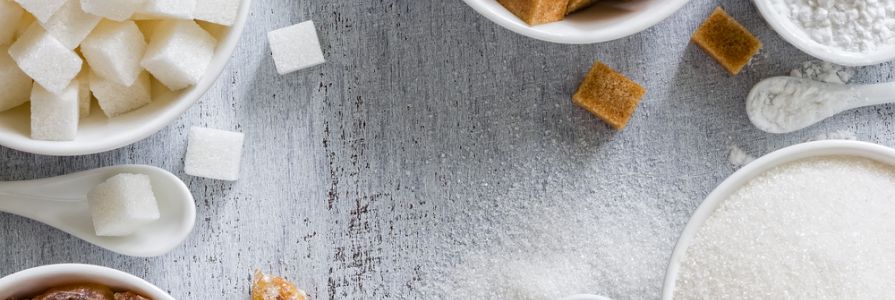Don’t let your sweet tooth get the best of you. Excessive sugar adds up to excessive calories, which can pack on the pounds.
The broad category of “sweeteners” includes caloric sweeteners (like white sugar, brown sugar, raw sugar, corn syrup, honey, maple syrup, molasses, and fruit syrups) as well as natural and artificial calorie-free sugar substitutes (including aspartame, sucralose, saccharin, stevia, and sugar alcohols).
All caloric sweeteners have roughly the same number of calories (about 20 calories per teaspoon and 60 calories per tablespoon). Sugars are a highly concentrated source of calories that don’t fill you up, so it’s easy to see how a high-sugar diet can promote weight gain. Most caloric sweeteners have no nutritional value outside of supplying calories — that’s why you’ll often hear them referred to as “empty calories.” (Blackstrap molasses is the one exception. It’s a concentrated source of iron, calcium, magnesium, and other minerals, but like other sweeteners, it’s calorie-dense and should be used only in small amounts.)
Honey, white sugar, brown sugar, and other caloric sweeteners are considered low-quality carbs because they’re made up of simple sugars that can rapidly raise your body’s blood-sugar levels. Eating sugary foods and drinking sugary beverages is basically like getting on an emotional roller-coaster ride that sends you up and down, and can potentially zap your energy level. Individuals with diabetes, who have an impaired ability to regulate their blood sugar, should dramatically limit their intake of all caloric sweeteners and sugary foods.
There are a number of other good reasons to cut back on sugar in your coffee, cereal, and homemade baked goods, as well as added sugars in packaged foods like soda and other sweetened drinks, cookies, candy, snack bars, and sweetened yogurts. Aside from the fact that the calories from sugar add up and can sabotage your weight-loss goals, sugar can also negatively impact the health of your teeth by promoting cavities and decay. In addition, scientists are currently exploring whether a high-sugar diet has a negative impact on your skin by causing inflammation in skin cells, resulting in acne and premature aging and wrinkles. A high intake of sugary foods and beverages has also been linked to high cholesterol, high triglycerides, and increased risk of developing type 2 diabetes.
Concentrated sources of fructose, such as sugar, honey, agave*, fruit juice, dried fruit, and candies and syrups that contain high-fructose corn syrup are common triggers for those with irritable bowel syndrome, and should be avoided if they worsen IBS symptoms.
*A special note about agave: Agave is a liquid caloric sweetener that is made of up to 90 percent fructose. Agave has a much higher percentage fructose than other sweeteners like sugar, corn syrup, and honey, which are all around 50 percent glucose and 50 percent fructose. Fructose doesn’t raise blood sugar as much as glucose, so agave is sometimes recommended as a better sweetener option for individuals with diabetes, prediabetes, or metabolic syndrome. However, agave has its own downsides. Concentrated sources of fructose like agave may increase triglycerides, which can negatively impact heart health. As mentioned above, fructose can also be problematic for individuals with IBS. As with all other sweeteners, you should limit your intake of agave to no more than a few teaspoons per day.
Now that you know why you should limit your intake of sugar, honey, agave, and other caloric sweeteners, here’s what you should know about the zero-calorie sugar substitutes.
Artificial sweeteners and zero-calorie natural sugar substitutes are commonly used by people to trim calories and overall sugar intake. Sugar substitutes do offer some benefits when used in place of caloric sweeteners. For one thing, they help many people who can’t kick their sweet tooth achieve their weight-loss goals. Sugar substitutes don’t raise blood sugars or promote insulin secretion, so they’re helpful tools for diabetics, who need to dramatically limit their intake of sugar and other calorie-containing sweeteners.
Interestingly enough, certain sugar substitutes can also help maintain healthy teeth. Xylitol, a sugar alcohol found in many brands of sugarless gum, can actually inhibit tooth decay by re-mineralizing the teeth. Chewing sugarless gum in general can also help protect your teeth by stimulating saliva to wash away food particles. The sugarless gum acts like a natural toothbrush and buffers the acid in your mouth to help protect your tooth enamel.
Though sugar substitutes can help individuals manage their weight and control diabetes, they’re certainly not for everyone and may have some downsides. (Besides, many people prefer to consume whole-foods diets and avoid foods that contain artificial sweeteners.)
First off, aspartame — marketed as NutraSweet and Equal — is frequently reported as a trigger for migraine headaches. People with a sensitivity to aspartame should avoid all foods and diet beverages containing this artificial sweetener.
Secondly, sugar alcohols, another class of sugar substitutes that includes sorbitol, maltitol, and mannitol, are common IBS triggers. If sugar alcohols cause you digestive discomfort, steer clear of all food, drinks, candy, and gum that contain them.
And finally, in my experience, using excessive artificial sweeteners and zero-calorie sugar substitutes can sometimes intensify sugar cravings by keeping the taste of sweetness on your taste buds and on your mind. If you choose to use sugar substitutes, my personal recommendation is no more than two packets or items per day (e.g., one packet in your coffee and one diet soda).






